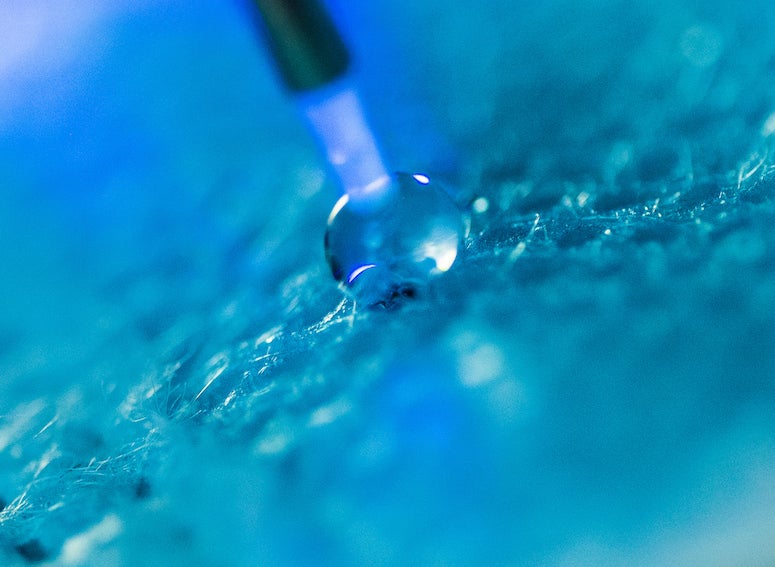HOUSTON – (Nov. 12, 2021) – Here’s the recipe to decontaminate a disposable facemask: Heat it at 160 degrees Fahrenheit in an oven for five minutes. You can use your own oven.
The science now bears that out, according to engineers at Rice University who, through extensive experimentation and modeling, determined that proper heating will eliminate the virus that causes COVID-19 from a standard disposable surgical mask without degrading the mask itself.

The work by mechanical engineer Daniel Preston of Rice’s George R. Brown School of Engineering, Rice graduate student Faye Yap and collaborators at the University of Texas Medical Branch (UTMB), Galveston, shows masks can be decontaminated and reused multiple times before degrading.
Best of all, heating to 70 degrees Celsius (approximately 160 F) killed more than 99.9% of SARS-CoV-2 and other viruses they tested, meeting FDA guidelines for decontamination. That shows promise for adapting the protocol to handle future outbreaks where personal protective equipment (PPE) is at a premium.
The research is detailed in the Journal of Hazardous Materials.
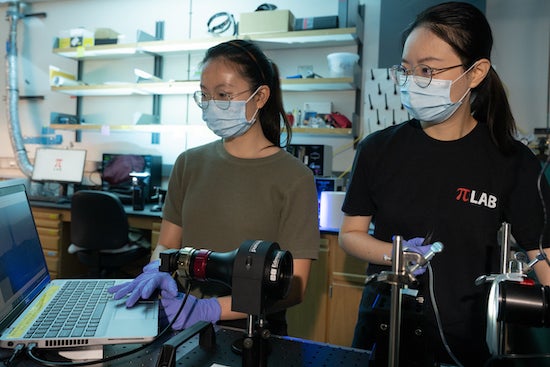
The paper is the third in a series prompted by the COVID-19 pandemic and supported by a National Science Foundation Rapid Response Research grant. The first paper in August 2020 suggested a thermal approach to decontamination would be viable. The second paper, which appeared this May, compared the effects of ambient temperature ranges on the virus in several U.S. locations.
The current study introduces a modeling framework researchers can use to determine just how much heat one needs, and for how long, to kill a particular virus. Preston pointed out the framework applies not only to airborne viruses like SARS-CoV-2, but also to viruses that live on surfaces and transmit primarily by touch.
In describing their strategy, study authors Yap and Preston detailed decontamination methods that have been tried but only work to a degree: exposure to ultraviolet light, because it doesn’t reach into folds or crevices common to masks; steam, because it can compromise the structure of a mask; or chemical disinfectants that can leave harmful residues and may also degrade the material.
“In general, it’s been shown that ultraviolet light is pretty effective, especially for flat or smooth surfaces,” said Preston, an assistant professor of mechanical engineering. “There’s a lot of good work out there, but not everyone has access to UV, and heat overcomes the issues presented by crevices or folds in fabrics.”
When Preston realized little had been done to create a modeling framework for decontaminating PPE, he decided his lab was right for the job, along with collaborators in Galveston who performed most of the heating experiments.
“We really didn't find anything in the literature that clearly described the effect of temperature on decontamination of viruses,” he recalled. “At least nothing that could be applied to the pandemic. That got us into this even before we applied for the grant.
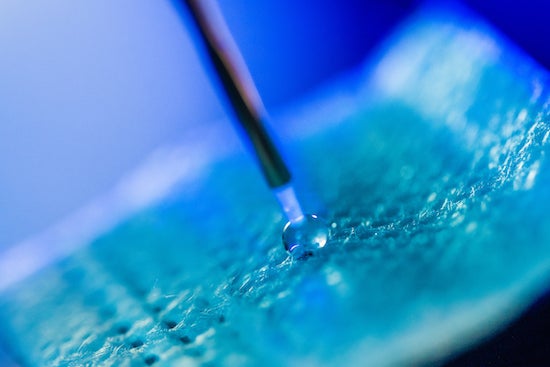
“Ultimately, what we hypothesized and have now found to be true is that the thermal inactivation of the virus can be easily explained by a combination of two fundamental relationships,” he said. “One of them is the Arrhenius equation, which relates the reaction parameters to temperature. And the other is the rate law, which uses those reaction parameters to tell you how fast a reaction occurs. In this case, the reaction is inactivation of the virus itself.”
It’s important to ensure the mask heats through, Yap said. Because masks are thin, that’s not as much of an issue as decontaminating larger objects, a topic of future study by the Preston lab. Heating to 70 C should work equally well for cloth masks, as long as all layers reach the required temperature for five full minutes.
She noted that if the heat is too high, the polymer fibers that make up most masks will melt, as they saw in microscope images of their samples. “At about 125 C, the (middle) filter layer in the mask starts to deform, and at 160 C it melts,” Yap said. “There’s a fine line when you start to approach the material’s melting point.”
But where the decontamination protocol does work, it works very well. “If you can get the entire mass to heat up to the proper temperature, 70 degrees C, then you will still inactivate the viruses within five minutes,” Yap said. Even heating masks to the proper temperature for up to 30 minutes did not significantly degrade them, she said.
While COVID-19 is hopefully fading in the West, Preston said a shortage of PPE remains a problem in many parts of the world. A simple and effective method to decontaminate masks could help many. However, the ability to reuse masks is not the be-all and end-all of staying safe during a pandemic.
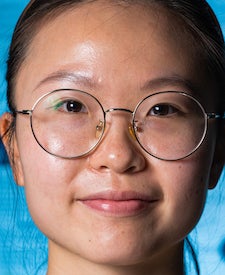


“I don't want to claim that thermal inactivation of viruses stabilized on surfaces is going to be the main contributor to preventing the spread of COVID-19,” he said. “Viruses are still going to spread through aerosolized droplets that transmit from one person to another. Masks can prevent that, and decontamination represents a secondary precaution to limit spread.”
Jason Hsu of UTMB is co-lead author of the paper. Co-authors are Rice graduate student Zhen Liu and research scientist Kempaiah Rayavara, graduate student Vivian Tat and Chien-Te Tseng, a professor of microbiology and immunology, at UTMB.
National Science Foundation grants 2030023 and 2030117 supported the research.
Images for download:

https://news-network.rice.edu/news/files/2021/11/1115_MASKS-1-WEB.jpg
Scanning electron microscope images by Rice University engineers show the effects of heat on the filter layer of a surgical facemask. The center image shows the polymer filter after decontamination at 70 degrees Celsius for 30 minutes. The right image shows the melted layer after exposure to 160 C for two minutes. The research team determined that a disposable mask can be decontaminated for reuse after five minutes at 70 C. (Credit: Faye Yap/Preston Innovation Laboratory)
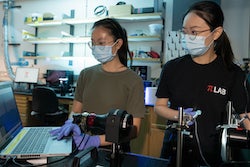
https://news-network.rice.edu/news/files/2021/11/1115_MASKS-2a-WEB.jpg
Rice University graduate students Faye Yap, left, and Zhen Liu characterize a mask sample. Researchers at Rice and the University of Texas Medical Branch, Galveston, have established a framework for properly decontaminating disposable facemasks. They determined that heating a mask in a 160-degrees-Fahrenheit oven for five minutes kills more than 99.9% of the viruses they tested, including SARS-CoV-2. (Credit: Jeff Fitlow/Rice University)
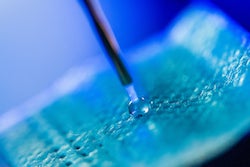
https://news-network.rice.edu/news/files/2021/11/1115_MASKS-3-WEB.jpg
Researchers at Rice University and the University of Texas Medical Branch, Galveston, inoculated pieces of standard surgical masks with droplets containing active viruses to determine the best method to decontaminate masks with dry heat. (Credit: Jeff Fitlow/Rice University)

https://news-network.rice.edu/news/files/2021/11/1115_MASKS-4a-WEB-Yap.jpg
CAPTION: Faye Yap. (Credit: Jeff Fitlow/Rice University)

https://news-network.rice.edu/news/files/2021/11/1115_MASKS-5-WEB.jpg
CAPTION: Daniel Preston. (Credit: Jeff Fitlow/Rice University)

https://news-network.rice.edu/news/files/2021/11/1115_MASKS-6a-WEB-LIU.jpg
CAPTION: Zhen Liu. (Credit: Jeff Fitlow/Rice University)
Located on a 300-acre forested campus in Houston, Rice University is consistently ranked among the nation’s top 20 universities by U.S. News & World Report. Rice has highly respected schools of Architecture, Business, Continuing Studies, Engineering, Humanities, Music, Natural Sciences and Social Sciences and is home to the Baker Institute for Public Policy. With 4,052 undergraduates and 3,484 graduate students, Rice’s undergraduate student-to-faculty ratio is just under 6-to-1. Its residential college system builds close-knit communities and lifelong friendships, just one reason why Rice is ranked No. 1 for lots of race/class interaction and No. 1 for quality of life by the Princeton Review. Rice is also rated as a best value among private universities by Kiplinger’s Personal Finance.

